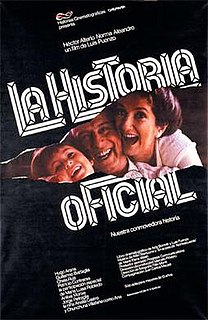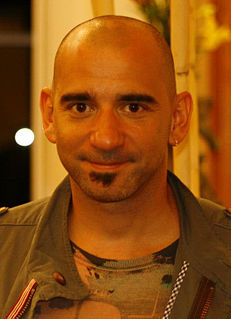
Argentina has submitted films for the Academy Award for Best Foreign Language Film since 1961. The award is handed out annually by the United States Academy of Motion Picture Arts and Sciences to a feature-length motion picture produced outside the United States that contains primarily non-English dialogue. [1] The award was not created until the 1956 Academy Awards, in which a competitive Academy Award of Merit, known as the Best Foreign Language Film Award, was created for non-English speaking films, and has been given annually since. [2]

Argentina, officially the Argentine Republic, is a country located mostly in the southern half of South America. Sharing the bulk of the Southern Cone with Chile to the west, the country is also bordered by Bolivia and Paraguay to the north, Brazil to the northeast, Uruguay and the South Atlantic Ocean to the east, and the Drake Passage to the south. With a mainland area of 2,780,400 km2 (1,073,500 sq mi), Argentina is the eighth-largest country in the world, the fourth largest in the Americas, and the largest Spanish-speaking nation. The sovereign state is subdivided into twenty-three provinces and one autonomous city, Buenos Aires, which is the federal capital of the nation as decided by Congress. The provinces and the capital have their own constitutions, but exist under a federal system. Argentina claims sovereignty over part of Antarctica, the Falkland Islands, and South Georgia and the South Sandwich Islands.

The United States of America (USA), commonly known as the United States or America, is a country comprising 50 states, a federal district, five major self-governing territories, and various possessions. At 3.8 million square miles, the United States is the world's third or fourth largest country by total area and is slightly smaller than the entire continent of Europe's 3.9 million square miles. With a population of over 327 million people, the U.S. is the third most populous country. The capital is Washington, D.C., and the most populous city is New York City. Most of the country is located contiguously in North America between Canada and Mexico.

The Academy of Motion Picture Arts and Sciences is a professional honorary organization with the stated goal of advancing the arts and sciences of motion pictures. The Academy's corporate management and general policies are overseen by a Board of Governors, which includes representatives from each of the craft branches.
Contents
Previously, in 1948, Argentina participated with Luis César Amadori's Dios se lo pague for an Honorary Award to the best foreign language film released in the United States, making it the first Argentine film to be presented in the Academy Awards. [3] It lost with Monsieur Vincent . These awards were not competitive, as there were no nominees but simply a winner every year that was voted on by the Board of Governors of the Academy.

Luis César Amadori was an Italian - Argentine film director and screenwriter and one of the most influential directors in the Cinema of Argentina of the classic era. He directed over 60 films between 1936 and 1967, writing the scripts to over 50 pictures.

Monsieur Vincent is a 1947 French film about Vincent de Paul, the 17th-century priest and charity worker. It depicts his struggle to help the poor in the face of obstacles such as the Black Death.
As of 2018 [update] , seven Argentine films have been nominated by the Academy for the Academy Award for Best Foreign Language Film. Two of these, Luis Puenzo's The Official Story and Juan José Campanella's The Secret In Their Eyes , won the award. [4] [5]

Luis Adalberto Puenzo is an Argentine film director, producer and screenplay writer. He works mainly in the cinema of Argentina, but has also worked in the United States.

The Official Story is a 1985 Argentine drama historical film directed by Luis Puenzo and written by Puenzo and Aída Bortnik. It stars Norma Aleandro, Héctor Alterio, Chunchuna Villafañe and Hugo Arana. In the United Kingdom, it was released as The Official Version.

Juan José Campanella is an Argentine television and film director, writer and producer. He is a prominent figure of cinema in his country, and achieved worldwide fame with the release of The Secret in Their Eyes (2009), for which he was awarded the Academy Award for Best Foreign Language Film.
Nine Argentine directors have had multiple films submitted to the Academy for review. Of these, Marcelo Piñeyro and Pablo Trapero have been selected a record three times, and only Juan José Campanella has managed multiple Oscar nominations. Since The Official Story took home the award at the 1986 Oscars, Argentina has never failed to submit a film to the competition.

Marcelo Piñeyro is an Argentine award-winning film director, screenwriter, and film producer.

Pablo Trapero is an Argentine film producer, editor, and director. He is considered one of the biggest creative forces in Latin American cinema.
Among all the countries that have received the Academy Award for Best Foreign Language Film, Argentina (with two awards) is one of four Spanish-speaking countries that have done so, the others being Chile (one award), Mexico (one award), and Spain (four awards). [4]

Spanish or Castilian, is a Romance language that originated in the Iberian Peninsula and today has hundreds of millions of native speakers in Spain and the Americas. It is a global language and the world's second-most spoken native language, after Mandarin Chinese.

Chile, officially the Republic of Chile, is a South American country occupying a long, narrow strip of land between the Andes to the east and the Pacific Ocean to the west. It borders Peru to the north, Bolivia to the northeast, Argentina to the east, and the Drake Passage in the far south. Chilean territory includes the Pacific islands of Juan Fernández, Salas y Gómez, Desventuradas, and Easter Island in Oceania. Chile also claims about 1,250,000 square kilometres (480,000 sq mi) of Antarctica, although all claims are suspended under the Antarctic Treaty.

Mexico, officially the United Mexican States, is a country in the southern portion of North America. It is bordered to the north by the United States; to the south and west by the Pacific Ocean; to the southeast by Guatemala, Belize, and the Caribbean Sea; and to the east by the Gulf of Mexico. Covering almost 2,000,000 square kilometers (770,000 sq mi), the nation is the fourth largest country in the Americas by total area and the 13th largest independent state in the world. With an estimated population of over 129 million people, Mexico is the tenth most populous country and the most populous Spanish-speaking country in the world, while being the second most populous nation in Latin America after Brazil. Mexico is a federation comprising 31 states plus Mexico City (CDMX), which is the capital city and its most populous city. Other metropolises in the country include Guadalajara, Monterrey, Puebla, Toluca, Tijuana, and León.
The Argentina nominee is selected annually by the Academia de las Artes y Ciencias Cinematográficas de la Argentina. The selection committee holds separate votes to decide which film goes to the Oscars and, in a separate vote, which film goes to the Spanish Goya Awards. [6]
The Goya Awards are Spain's main national annual film awards.